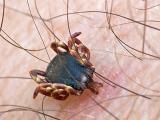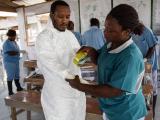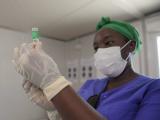A hunt to find the animal reservoir for Ebola that began in 2016 in the wake of Sierra Leone's outbreak has found live Marburg virus, a related pathogen that can also cause hemorrhagic fever, for the first time in West Africa.
The discovery came from researchers involved in two projects: one led by the US Centers for Disease Control and Prevention (CDC) and Njala University in Sierra Leone and the other a US Agency for International Development (USAID)-funded team from the University of California (UC), Davis, and the University of Makeni in Sierra Leone.
Marburg virus, harbored by Egyptian fruit bats, has caused 12 known outbreaks in sub-Saharan Africa. In 2005, the largest event of its kind sickened 252 people in Angola, about 90% of them fatally. The most recent outbreak struck Uganda in 2017.
The disease is on the World Health Organization's priority list and is among its top research and development priorities.
Positive samples from multiple sites
In separate press releases today, the CDC and UC Davis said five Egyptian rousette fruit bats tested positive for active Marburg infections. The bats were caught at separate locations in three of Sierra Leone's health districts: Moyamba, Koinadugu and Kono.
Marburg infections have yet to be reported in Sierra Leone, but bats carrying the virus put people at risk for illness. The animals shed the virus in their saliva, urine, and feces as they feed on fruit. People or animals who eat the contaminated fruit can contract the virus, and people can also be infected through bat bites while capturing them for food.
Jonathan Towner, PhD, who led the CDC team, said scientists have long known that rousette bats live in Sierra Leone, so it's not surprising that Marburg virus was found in bats there. "This discovery is an excellent example of how our work can identify a threat and help us warn people of the risk before they get sick," he said in the CDC release.
In caves and underground mines in eastern and central Africa, the bats are known to roost in colonies of more than 100,000. Sierra Leone's colonies, however, are much smaller, which the CDC said may explain why the country has not had any known Marburg outbreaks.
Brian Bird, DVM, MPH, PhD, with the UC Davis One Health Institute and global lead for Sierra Leone and multicountry Ebola operations with the PREDICT-USAID project, said in the UC Davis release, "That the discovery was made in bats before the recognition of any known human illnesses or deaths is exactly what PREDICT's One Health approach to disease surveillance and capacity building are designed to do."
Tests indicate long-time circulation
Tests on samples from four of the five positive bats identified multiple genetically diverse strains, suggesting that Marburg virus has been circulating in Sierra Leone's bat colonies for many years.
Two of the strains are genetically similar to a strain that triggered an outbreak in Angola, the researchers said, indicating the first detection of the Angolan Marburg strain in bats.
Public health implications
Based on the Marburg findings, the researchers and health officials are meeting with local communities in Sierra Leone to present their data, answer questions, and teach people how to reduce their risk of exposure to the virus, UC Davis said in its press release.
It added that fruit bats play important ecological and agricultural roles, such as pollinating crops and eating insects, such as mosquitoes, that spread disease and damage crops.
Scientists emphasize that people shouldn't kill or eradicate bats based on the findings, adding that killing them and having contact with the animals can boost the risk of virus transmission instead of decreasing it.
See also:
Dec 20 CDC press release
Dec 20 UC Davis press release



















